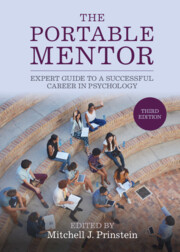Book contents
- The Portable Mentor
- The Portable Mentor
- Copyright page
- Dedication
- Contents
- Figures
- Tables
- Boxes
- Contributors
- Preface
- Acknowledgments
- Part I Applying to Graduate School
- Part II Beginning your Career
- 3 Your First Year of Graduate School
- 4 Following the Scientific Path in Applied Psychology
- 5 Impostor Syndrome in Graduate School
- 6 Cultural Humility in Psychology
- 7 Graduate Training for Students of Color: Belonging Required; Fitting In, Not Recommended
- 8 Navigating Graduate School in Psychology as a Sexual and/or Gender Minority (LGBTQ+) Student
- 9 Considerations for First-Generation Students in Graduate School
- 10 Developing and Practicing Ethics
- Part III Your Research/Academic Career
- Part IV Your Career as a Practitioner
- Part V Your Professional Service Career
- Part VI Your Career After Graduate School
- Index
- References
8 - Navigating Graduate School in Psychology as a Sexual and/or Gender Minority (LGBTQ+) Student
from Part II - Beginning your Career
Published online by Cambridge University Press: 21 July 2022
- The Portable Mentor
- The Portable Mentor
- Copyright page
- Dedication
- Contents
- Figures
- Tables
- Boxes
- Contributors
- Preface
- Acknowledgments
- Part I Applying to Graduate School
- Part II Beginning your Career
- 3 Your First Year of Graduate School
- 4 Following the Scientific Path in Applied Psychology
- 5 Impostor Syndrome in Graduate School
- 6 Cultural Humility in Psychology
- 7 Graduate Training for Students of Color: Belonging Required; Fitting In, Not Recommended
- 8 Navigating Graduate School in Psychology as a Sexual and/or Gender Minority (LGBTQ+) Student
- 9 Considerations for First-Generation Students in Graduate School
- 10 Developing and Practicing Ethics
- Part III Your Research/Academic Career
- Part IV Your Career as a Practitioner
- Part V Your Professional Service Career
- Part VI Your Career After Graduate School
- Index
- References
Summary
Sexual and gender minority (SGM) students may face unique opportunities and challenges in their journey to become psychologists. The increasing visibility of LGBTQ+ identities highlights the need for SGM identity-specific professional mentorship in the field of psychology. Yet, for some, this can be challenging to find. This chapter is intended to serve as a guide for SGM students navigating graduate school and early career milestones. We review a variety of common professional development issues for SGM psychology trainees: openness and privacy about your SGM identity in professional settings, considering priorities when identifying a primary mentor and school, connecting with additional mentors, identifying and fostering an inclusive environment on campus and in the community, self-care, navigating interpersonal relationships, advocacy, and providing mentorship to junior colleagues. We also include specific resources for SGM students and professionals. In addition to serving as a guide specifically for SGM students, we hope this chapter can benefit allies including mentors and colleagues with education about common SGM experiences.
- Type
- Chapter
- Information
- The Portable MentorExpert Guide to a Successful Career in Psychology, pp. 144 - 165Publisher: Cambridge University PressPrint publication year: 2022



